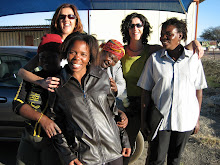Thursday, June 25, 2009
Tapologo

Directed by Gabriella and Sally Gutierrez Dewar
Tapologo is a full-length documentary shot in Northwest Province, South Africa. Directors Gabriella and Sally Gutierrez Dewar chronicle a handful of the 20,000 displaced African refugees in a squatter camp called Freedom Park. Here we are exposed to life and death in a place where fifty percent of the women are infected with HIV.
The film is divided into two parts. Part one opens inside the shack of an emaciated woman receiving care from two local nurses. The woman is dying from Tuberculosis, and for a moment she glances directly into the camera lens with brown eyes that appear to have lost all innocence and hope. As we get to know other patients and nurses who inhabit the park, we see that most of the women have slept with men for money, many have contracted HIV, yet only some are receiving anti-retroviral treatment. All of them are either dying or fighting to survive. Personal accounts from the women are interlaced with stunning visual images that are both emotional and relevant, and the intensity never lets up.
The second part begins with desolate music by Joel Assaizky and shots of people walking across train tracks, sitting on sides of roads, just standing around watching each other. This time is spent contextualizing the squalor of Freedom Park in the apartheid aftermath. In a place where the alternative to starvation is sexual exploitation, it’s impossible to ignore the political history.
Then we learn about Tapologo, a collective of female caregivers who self-organize and treat the hopelessness of their immediate surroundings. Before this network existed, individuals were left alone with their chronic diseases as poverty and pain devoured them. Now these strong women, many of them diagnosed with HIV themselves, have begun to administer anti-retroviral treatment and provide bedside and hospice care. As a result, a community has begun to form, and with the help of Brother Joe, Sister Georgina, and bishop Kevin Dowling (Catholic community leaders and activists who share relatively progressive ideology), Tapologo has begun to break Freedom Park's cycle of poverty, patriarchy and an overall loss of dignity.
One scene in particular illustrates the spirit of this film. A nurse named Thembi (a former sex-worker and HIV victim) pays a visit to the shack of a helpless woman and her infant. She says confidently, "Filth can make the illness worse," and begins to wash dishes and floors on her hands and knees. For Thembi and others, volunteering with Tapologo gave them a chance to believe in themselves, to find beauty within, and to be proud of life's small victories. This moment, and this film, is a great reminder to step out of our daily comforts and confront real issues facing real women.
Review by Katy Pine

No comments:
Post a Comment